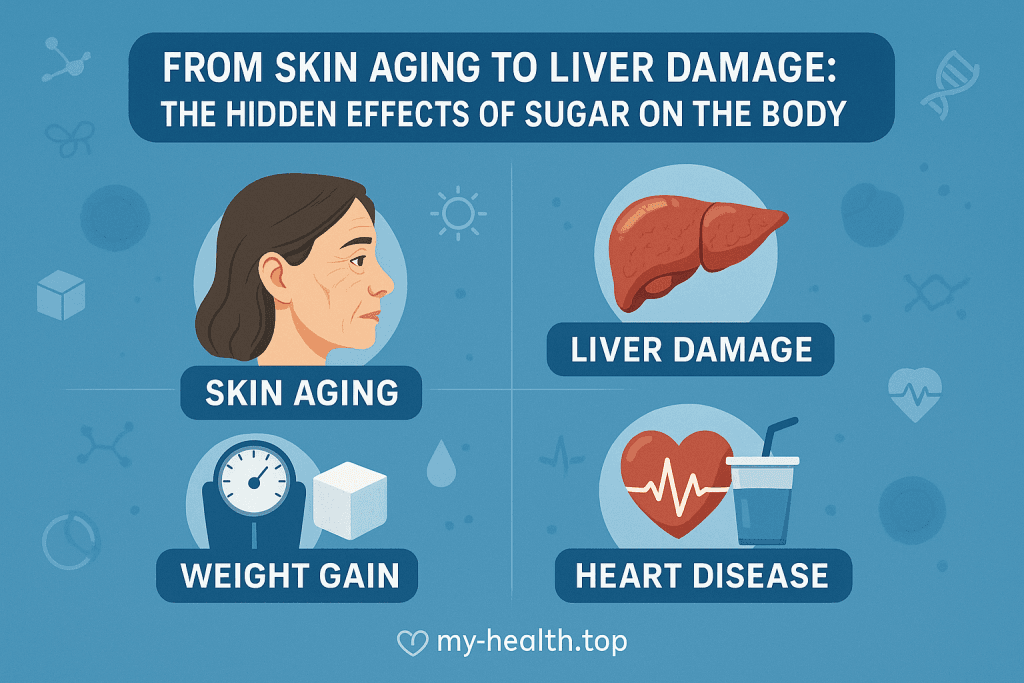A study from WebMD warns that added sugar, even in seemingly healthy foods, can lead to inflammation, weight gain, premature skin aging, and impaired function of organs such as the liver and pancreas.
Sugary drinks, candies, baked goods, and sweetened dairy products are the main sources of added sugar, but even some savory foods like bread, ketchup, and protein bars can contain sugar.
It can be difficult to identify added sugars from nutrition labels because they may appear under different names such as corn syrup, agave nectar, date sugar, cane juice, or sucrose.
No matter what it’s called, sugar is still sugar — and when consumed in excess, it can negatively affect your body.
Brain
Eating sugar triggers the release of the chemical dopamine in your brain. That’s why at 3 p.m. you crave a candy bar more than an apple or a carrot!
Since whole foods like fruits and vegetables don’t release as much dopamine, your brain starts to need more and more sugar to reach the same feeling of pleasure. This makes it much harder to resist that after-dinner ice cream.
Mood
An occasional sweet or cookie can give you a quick boost of energy by rapidly raising your blood sugar. When your blood sugar drops afterward as your cells absorb the sugar, you may feel anxious or jittery — a so-called “sugar crash.”
But if you regularly overdo sweets, sugar can affect your mood more deeply: studies have linked high sugar intake to an increased risk of depression in adults.
Teeth
You may have rolled your eyes at your parents when you were 12, but they were right: candy can damage your teeth. The bacteria that cause cavities love to feed on the sugar that stays in your mouth after you eat sweet foods.
Joints
If you have joint pain, here’s one more reason to skip candy: eating a lot of sweets has been shown to worsen joint pain because of the inflammation they cause in the body.
In addition, studies show that people who consume a lot of sugar — in food or drinks — may be at higher risk of developing rheumatoid arthritis.
Skin
Another side effect of inflammation is that it can make your skin age faster.
Excess sugar binds to proteins in your bloodstream and forms harmful molecules called AGEs (advanced glycation end products). These molecules age your skin.
In other words, they damage your skin’s collagen and elastin and lead to wrinkles and sagging.
Liver
Added sugar may contain fructose or high-fructose corn syrup. Fructose is broken down in the liver and, in large amounts, can damage it. When fructose is metabolized in the liver, it is turned into fat. As a result, this can lead to:
- Nonalcoholic fatty liver disease (NAFLD): excess fat builds up in the liver.
- Nonalcoholic steatohepatitis (NASH): fatty liver with inflammation and steatosis, which means liver scarring. Scarring eventually disrupts blood flow to the liver. Many of these cases progress to cirrhosis and the person may need a liver transplant.
Heart
When you consume too much sugar, the excess insulin in your bloodstream can affect arteries throughout your body. This can make the walls of your arteries inflamed, thicker than normal, and stiffer — putting extra strain on your heart.
This sets the stage for heart disease such as heart failure, heart attacks, and stroke.
Research also shows that eating less sugar can help lower blood pressure, a major risk factor for heart disease.
In addition, people who get a lot of their calories from added sugar (at least 25% of their daily calories) are twice as likely to die from heart disease as people whose diet includes less than 10% of calories from added sugar.
Pancreas
When you eat, your pancreas releases insulin. But if you consume too much sugar and your body doesn’t respond properly to insulin, the pancreas starts to release even more insulin.
Eventually, the overworked pancreas can no longer keep up, blood sugar levels rise, and the risk of type 2 diabetes and heart disease increases.
Kidneys
If you have diabetes, eating too much sugar can lead to kidney damage.
Your kidneys play a key role in filtering your blood. When your blood sugar reaches a certain level, the kidneys start to release the excess sugar into the urine.
If diabetes is not controlled, it can damage the kidneys, preventing them from filtering waste from the blood — and eventually leading to kidney failure.
Body Weight
The link between sugar and weight gain is nothing new. Research shows that people who drink sugar-sweetened beverages weigh more than those who don’t — and are at higher risk for type 2 diabetes.
Another study showed that people who added more sugar to their diet gained about 1.7 pounds (770 grams) in less than 2 months. Extra sugar can inflame fat cells and promote weight gain.








Post a comment